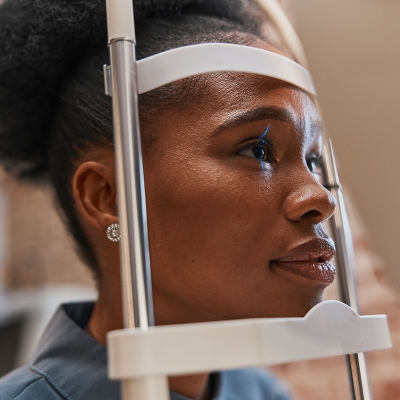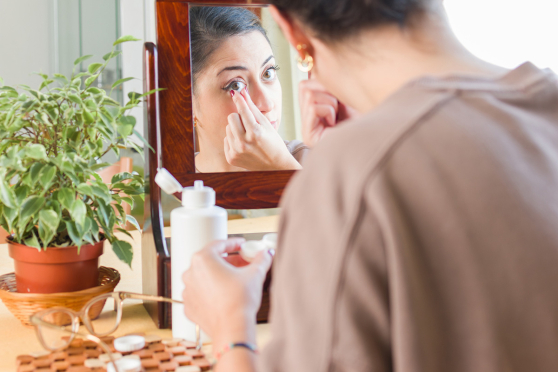How allergies can affect a person’s eyes
Learn what can happen and how to find relief from eye-related symptoms.

It's allergy season again. It usually runs from about March through October — and allergies can bring on a host of uncomfortable symptoms.1 Some of these can affect the eyes.
Eye allergies, or allergic conjunctivitis, are common. They can be caused not only by allergens during specific seasons, but also by allergens around the house.2
Learn how allergies can affect a person’s eyes — plus, how to get relief from their symptoms.
Another way to get relief for your eyes? Finding the right eye care provider. Search the UnitedHealthcare Vision Network today.
What types of eye allergies can people get?
Eye allergies can come in 2 common forms:
- Seasonal
- Perennial
Seasonal eye allergies are the most common. They happen during specific times of the year because of outdoor allergens, like pollen (more on this below). Pollen is a fine, powdery substance that plants, weeds and trees produce.
Perennial eye allergies can happen all year long and can be caused by indoor allergens.3
Other types of eye allergies, which can be rarer or more serious, can include:3
- Atopic keratoconjunctivitis. This tends to affect mostly older men who have a history of allergic dermatitis. That’s a condition where the skin becomes inflamed. If left untreated, it could lead to scarring of the cornea (the clear outer layer of the eye).
- Contact allergic conjunctivitis. This can happen because of irritation from contact lenses or proteins from tears that stick to the lens’ surface.
- Giant papillary conjunctivitis. This can also happen to people wearing contact lenses. It can cause fluid sacs to form on the eyelids.
- Vernal keratoconjunctivitis. These are more serious than seasonal or perennial eye allergies. They can affect people year-round. They typically occur in boys and young men. About 75% of them also have eczema (a condition that affects the skin) or asthma (a condition that affects the airways).
What can cause eye allergies?
Eye allergies can happen when allergens get in a person’s eyes and irritate them. An allergen could be a range of things, not just related to the seasons. Examples can include:2,3,4
- Certain over-the-counter (OTC) or prescription drugs
- Certain over-the-counter or prescription eye drops
- Cigarette smoke
- Diesel exhaust
- Cosmetics, like makeup, nail polish and more
- Dust
- Foods
- Insect bites or stings
- Mold
- Perfume
- Pet dander (dead skin cells)
- Pollen from grass, trees and ragweed
- Pollution
- Smoke (forest fire or other)
What are the symptoms of eye allergies?
A person might experience certain symptoms when they’re exposed to these allergens. These can include:2,3,4
- Burning or irritated eyes
- Dry eyes
- Itchy eyes
- Light sensitivity to the eyes
- Red or sore eyes
- Swollen and puffy eyelids
- Tearing eyes
- Twitching eyes
How can a person tell if they have eye allergies?
Experiencing any of the symptoms listed above? It’s a good idea for a person to schedule an appointment with an eye care provider. They can help identify the root cause of the issue and get a person the treatment they need.
In certain cases, an eye care provider might recommend a person to an allergy specialist (allergist). They could offer additional help in treating certain allergies or prescribing certain medications.
Here are some potential treatment options an eye care provider or allergist could offer:4
- Allergy shots
- Eye drops
- Nasal inhalers
- Oral medicines
What can a person do to get relief from eye allergies?
Besides seeing an eye care provider or allergist, there are things a person can do at home to get relief from eye allergies. Here are some potential strategies:2,4,5
- Do some spring cleaning. Pet dander, dust and other allergens can build up around the house. Use a broom, wet rag or damp mop to clean up — plus, don’t forget to change and wash bedding regularly. Especially, if a pet likes to lounge on top of it.
- Don’t rub the eyes. If a person goes outside and touches something with pollen on it, then rubs their eyes, they could be dealing with eye allergy symptoms.
- Find the right makeup. Wear makeup to work every day? Make sure that it isn’t the type that will trigger eye allergies. Choose makeup with natural ingredients that’s designed for sensitive eyes.
- Invest in a dehumidifier. This can help keep mold out of humid places in the house like the basement.
- Shower regularly. Showering every night can help remove things like pollen from the body.
- Try artificial tears or eyedrops. A person’s eye care provider might recommend using OTC, lubricating eye drops to relieve symptoms. They might also write a prescription for certain eyedrops or offer an OTC option.
- Turn on the air conditioner. During warmer months, open windows can let allergens into a person’s house.
- Use a cold compress. Dealing with red or itchy eyes? A cold cloth or compress can provide temporary relief.
- Wash the hands. This can help remove any potential allergens that could transfer to other parts of the body if touched.
- Wear glasses or sunglasses. Believe it or not, the lenses in glasses and/or sunglasses can help protect the eyes from pollen.
Eye care providers in the UnitedHealthcare Vision Network are here to help keep your vision healthy — and treat your allergies. Search for a network eye care provider now.
Sources:
- Get ready for allergy season Harvard Health Publishing Harvard Medical School, April 2024.
- What are eye allergies? American Academy of Ophthalmology, October 2024
- Eye allergy American College of Allergy, Asthma, & Immunology
- How to prevent eye allergies Optometrists Network
- Why are my eyes itchy? Answers from an expert Johns Hopkins Medicine


